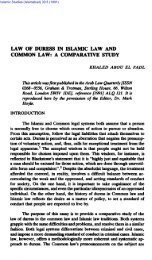ORPHANED GRANDCHILDREN IN ISLAMIC SUCCESSION LAW
ORPHANED GRANDCHILDREN IN ISLAMIC SUCCESSION LAW
ORPHANED GRANDCHILDREN IN ISLAMIC SUCCESSION LAW
You also want an ePaper? Increase the reach of your titles
YUMPU automatically turns print PDFs into web optimized ePapers that Google loves.
<strong>ORPHANED</strong> <strong>GRANDCHILDREN</strong> <strong>IN</strong> <strong>ISLAMIC</strong> <strong>SUCCESSION</strong> <strong>LAW</strong> 259<br />
be other orphaned children related to the deceased or other cases<br />
of need amongst his relatives not close enough to benefit as heirs<br />
equally entitled to enjoy the benefits of any system of obligatory<br />
bequests that might be set up on this basis.<br />
As long as tbe concept is preserved of a legacy being a<br />
voluntary disposition by a Muslim of a certain proportion of his<br />
estate the foregoing questions are not so pressing. The legator, on<br />
the particular facts of his particular family, bequeathes legacies to<br />
those deserving special consideration without it being necessary, in<br />
the case of relatives, to determine whether they are close relatives<br />
or not (in his own eyes or the eyes of the law). The test for a<br />
justifiable legacy is primarily need and not the strength of the<br />
blood-relationsbip. As long as bequests are voluntary dispositions<br />
the beneficiaries will naturally and justifiably vary from case to case<br />
and each such case is fully capable of keeping within the true<br />
Islamic spirit regarding legacies. Thus where P dies at an advanced<br />
age leaving one living son A and a grandson B by another<br />
predeceased son C. the grandson being well over thirty at the time<br />
of P's death and already well-provided for by his own father's<br />
estate, it may well be that P should provide instead by legacy for<br />
D, an infant or crippled grand-nephew. For legacies, almost by<br />
definition in Islamic terms. are primarily for the needy rather than<br />
the closely related.<br />
But once this voluntary element from bequests is removed, it<br />
becomes extremely important to base this third-party compulsion and<br />
this alteration of the wishes of the deceased upon a consistent princi-<br />
pleeither of need or of relationship combined with need. Otherwise<br />
the system of obligatory bequests can easily become. in course of<br />
time, a means wbereby a Muslim is deprived of dealing with one-<br />
third of his estate in complete violation of the spirit of legacies.<br />
Legacies are in fact. also almost by definition, voluntary dispositions<br />
of a person's estate by will, and the phrase "obligatory bequest" is<br />
(virtually) a contradiction in terms.<br />
With these inherent difficulties in the system of obligatory<br />
bequests, the question arises as to why it was adopted ? The<br />
explanation seems to lie in the reformers having concentrated their<br />
attention on trying to disturb the rights of the established heirs as<br />
little as possible. Where other legacies to the extent of one-third<br />
had already been made. the amounts to be received by the heirs<br />
would not be affected at all; the obligatory bequests being extracted
















